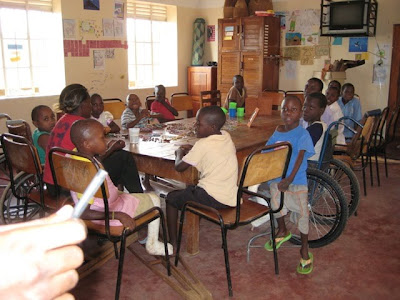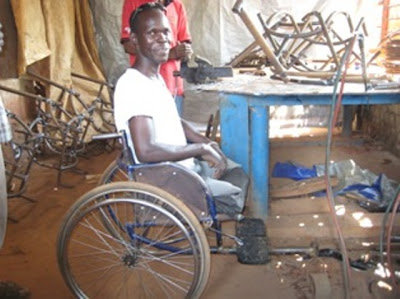They have come in answer to our request for a wheelchair specialist to help us plan a wheelchair project. The church’s wheelchair program has changed focus and instead of giving out wheelchairs to those in need it involves finding a partner and distributing wheelchairs through the partner. The partner has to be someone with the ability to produce wheelchairs, assess recipients, custom fit the chairs, and then train recipients in using the wheelchair helping them to become more independent.
We spent a couple of days visiting wheelchair production sites in Kampala. Uganda has a National Wheelchair Committee that has outlined the same goals for recipients that we have and it looks like we will be able to partner with them and meet all of our requirements.
We met with Rose, Chairmen of the National Wheel Chair Committee, and asked her to help us visit the wheelchair production sites in Uganda. We had a sit down meeting with some of the members of the committee and made a plan.
Patrick gave us a tour of Mulago Hospitals wheel chair production. Wentz gave us a tour of Katalemwa Cheshire Homes Rehab. Center and we made a trip north to Gulu to evaluate Gulu Youth Development Association's workshop.
Mulago's workshop is housed in the old hospital that was built in 1935. The new Mulago Hospital is the largest government hospital in Uganda it is the hospital that receives referrals from all over Uganda. It has a lot of good things going on but as all hospitals in Africa it has great needs.
A well used old wheelchair from Mulago workshop
Can't get this to load upright but you get the picture. This chair can be made in two sizes. It is patterned after an old design called "the Huckstep."
Katalemwa Cheshire Home has an amazing rehab. center where they bring children for recovery after surgery and provide them with a place to stay and give them extensive therapy while they recover. They require that a parent or guardian stay with the child the whole time they are at the home. This allows the mother to learn to care for their child, the child will not be so frightened of procedures and the parent can guarantee the security for their child.
Mothers are given a chance to learn crafts and have a chance to sell their craft and earn some money to sustain them while at the center. Care is free or what ever the family can pay.


Katalemwa's wheelchairs are all of one design and they make the chair 3 different sizes.
They also have school for the children as they are often there for a long time. The day we were there the class was making jewelry and having a choir practice. The choir performs and helps the center with fundraising.
We met a mother and her baby at the center who lives in a remote village. The child's foot got infected and they tried folk medicine to help the baby but eventually the mother was directed to Mulago hospital but the foot was septic and they had to amputate the baby's foot. The good news is that Katalewma will follow this baby and support the mother with proper orthotics and therapy as the baby grows. This baby was beautiful and was doing well when we saw her.
We also met the poster child for the center. She is featured on their brochure. We could see why as she has a winning smile and a personality to match. She has cerebral palsy and is being cared for by the center. She certainly won our hearts.
We had to let the Dows go. They had other countries to visit and plan more wheelchair projects. They will continue to work on our project with us but from their home in California.
The next day we headed up to Gulu in search of GYDA.
The Gulu area has quite a history and has been ravaged by war many times and especially in the last 30 years. In 1986 local man, Josephy Kony brought together a cohort of rebel groups under the umbrella of the “Lord’s Resistance Army.” Kony claimed to be possessed by religious powers enabling him to be a medium. Having no known agenda or direction, the violent, unpredictable, and impulsive LRA movement began terrorizing the Acholi people.
The LRA would abduct children, maim people in grotesque ways, and raid schools, health centers in the day and at night. The descriptions of the crimes constitute some of the most vile ways of treating fellow humans. Ironically, the LRA claimed to be protecting the Acholi people as it terrorized them. Over 400,000 persons were internally displaced in Uganda in Gulu and Kitgum Districts. In 2000 the area suffered an outbreak of Eboli. Fast forward to 2010 and you enter Gulu to see many people trying to put their lives back together. There is much rebuilding going on and the town only has a vestige of its past. There are many disabled people in the city and many in the outlying areas resulting from the wars and landmine accidents.
It's a three hour drive to Gulu. A beautiful drive where we pass right by the national reserve where there are several safari parks. You cross the Nile at a site where there are great rapids
and you often run into baboons sitting on the side of the road.
Gulu Youth Development Association (GYDA) is an organization that was started in 1992 by a group of youth with an interest in creating employment opportunities for the under-privileged youth in the district. The organization aimed at finding the means by which the youth could address their unemployment problems through a concerted effort and active participation in feasible economic, health, apprenticeship and training programs. It is a vocational school for underprivileged youth targeting street youth, orphans, disabled youth, school drop-outs, war effected youth and youth parents. They expanded their skills and in 1999 started making wheel chairs.
We had previously met Fred, the director of Gulu Persons with Disabilities Association, a wheelchair user himself. He is also a member of the National Wheelchair Committee. He met us at the center to introduce us and pave the way for a tour.
Upon entering GYDA's complex we were overwhelmed by the activity going on. Most of the youth were preparing for dinner. The center feeds its members a meal every day. All the kids were happy, joking with each other, and anticipating dinner. They all wore GYDA tee shirts and it was evident that everyone had been working that day. We visited a sewing room where kids were learning to sew the cushions for the wheelchairs.
There was a welding shop, a wood shop, an area for sealing and painting and a storage area with many wheelchair frames ready for assembly.
A graduate of the center, Thackery, was welding when we entered the workshop.
He had no legs and sat in a wheelchair. He was protected from the welding by goggles and a blanket. Kilama Robert, the administrator of GYDA, told us that Thackery was able to do welding because it didn’t take much strength and it was a good job for him. Farrell, looking at the young man’s muscular upper body told Robert that it didn’t look like he was lacking for strength as he had muscles bulging everywhere. Thackery grinned real big and we are sure we saw him blush.
The center has two Peace Corp. volunteers who will help their training center for two years. Drew had developed their website making it look very professional. They are a great asset as they give their service and expert advise.
This chair is for a student with a desk that can flip up while in the classroom.
Their wheelchair design has been modified and upgraded several times and looks much like the WORLDMADE wheelchair which is one of the chairs that the church has shipped in for projects. They receive most of their funding through USAID and are limited on their production of wheelchairs because of monies but estimate that their are 3,000 people needing wheelchairs at this time.
We left the center with Fred and went over to the Gulu Disabled Persons headquarters.
Fred was paralyzed at age 15 due to the treatment he received after falling out of a tree. He has dedicated his life to being an advocate for the disabled. He runs a peer training program for disabled people. It is a week course where the person receiving a wheelchair is brought to his center to live for a week and learn how to live with their disability. It is a do or die type training, something you might call boot camp. A person is removed from their caregivers and have to learn to survive. They are trained and taught by a peer, disabled person, to help them learn to be independent and care for themselves. They learn to live in a wheelchair and learn what they can do, not what they can’t do. It is a great program and will add a lot to our wheelchair project.
Fred works in Gulu with this association for the disabled but his home is just outside Kampala. It must be a labor of love as it certainly is real convient for him as he travels home by bus taking his wheelchair with him. This association works hard to meet the needs of the blind, the deaf, women with disabilities and landmind victims.


















4 comments:
Mom and Dad, changing the world ...
Very impressive stuff going on there. Too bad you can't bring the chickens home. Carrie would love some chickens.
In desperate need of a wheelchair or crutches for my Mom.
She’s been immobile for close to 8 months now.
Any leads?!
She’s in Mbarara, Western Uganda.
Are you still making and distributing wheelchairs in the Gulu area?
Post a Comment